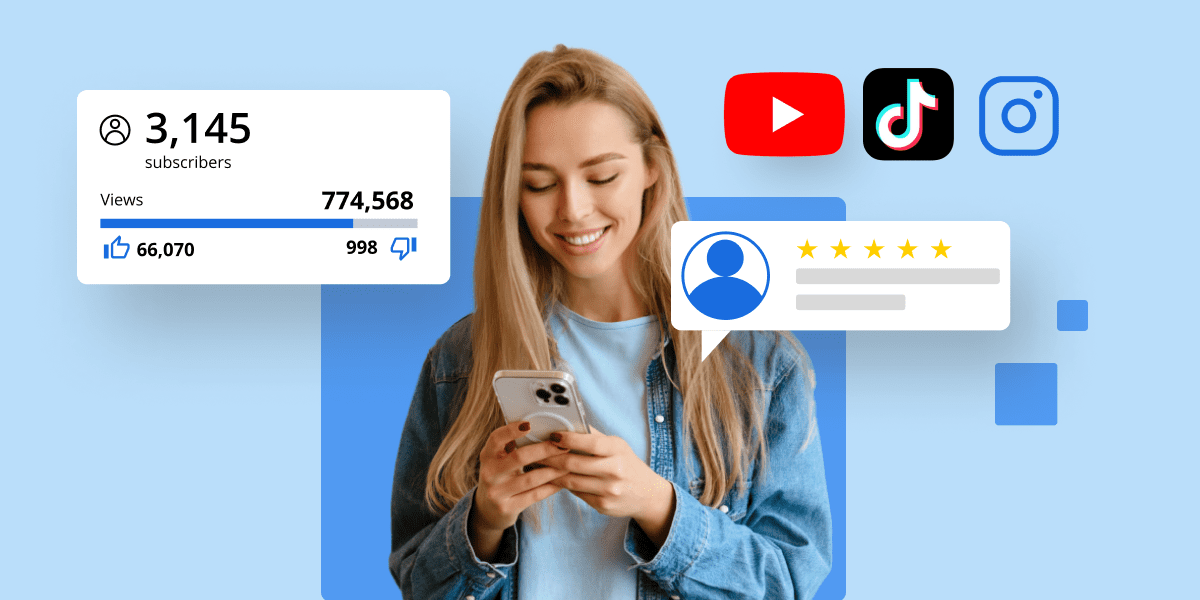I’ve been watching the rise of faceless content creators with real interest over the past few years. What started as a niche approach has now become a legitimate strategy for building audiences and making money online. The best part? You don’t need to show your face or build a personal brand to succeed.
Today, I’m going to walk you through everything you need to know about creating successful faceless videos for TikTok and Instagram. We’ll look at what works, why it works, and how you can start implementing these strategies right away.
What Are Faceless Videos (And Why Are They So Popular)?
Faceless videos focus on delivering information, beautiful visuals, or compelling stories rather than showcasing the creator’s personality. Think product demonstrations, tutorials with just hands visible, AI-generated stories, or aesthetic B-roll footage.
The numbers behind this trend are impressive:
- Faceless TikTok videos get 52% higher shares when paired with trending sounds
- Instagram Reels from faceless accounts generate 67% more engagement than traditional posts
- 71% of marketers report higher engagement rates with video content compared to static posts
But why are viewers so drawn to this content? There are a few key reasons:
The Psychology Behind Faceless Content’s Success
- Curiosity and mystery – When you don’t see the creator, it creates an intriguing element that keeps viewers coming back
- Focus on value – Without a face to focus on, viewers concentrate entirely on the information or story being presented
- Niche expertise – Tutorials and product reviews can build authority without requiring personal branding
- Algorithm neutrality – Both TikTok and Instagram’s algorithms reward high retention regardless of whether you show your face
Winning Content Strategies for TikTok
TikTok offers unique opportunities for faceless creators. Here are the content formats that have proven to get the most views and engagement:
1. AI-Generated Storytelling
Tools like Runway ML and Pippit now make it possible for anyone to create animated narratives with minimal technical skills. Channels using this approach, like @ai_story_time, average 13,000 views per day.
The key is using text-to-speech voices that sound natural and creating visuals that don’t fall into that awkward “uncanny valley” that can turn viewers off.
2. Product Demonstrations
Point-of-view (POV) tutorials work incredibly well in the faceless format. Think about screen recordings showing how to use apps, or hands demonstrating how products work.
What makes these successful is their focus on actionable takeaways. Some of the most popular faceless accounts in this category see views in the millions.
A particularly effective format is the split-screen comparison (like “Product A vs. Product B”), which sees 23% higher completion rates than single-product showcases.
3. Trend-Based Challenges
One of the smartest ways faceless creators succeed is by adapting trending sounds and challenges to their niche topics.
For example, a gardening account that used the popular “Oh No” sound to narrate a plant-care mistake saw 450,000 views in just 48 hours—without ever showing their face.
Optimizing Your TikTok Videos for the Algorithm
Creating great content is just the first step. To really succeed on TikTok, you need to understand how to work with the algorithm:
Hook Engineering
The first 3 seconds of your video are absolutely critical. Videos that clearly state their premise within this timeframe have a 63% higher click-through rate.
Strong hooks for faceless videos might look like:
- “This $15 tool saved me 3 hours every week—here’s how” (with a close-up of the product)
- “The editing trick most creators miss” (followed by a screen recording)
- “Watch me turn $100 into $300” (showing money or investment app)
Optimal Posting Schedule
| Day Type | Best Times for TikTok (UTC) |
|---|---|
| Weekdays | 6–9 AM, 11 AM–2 PM, 7–10 PM |
| Weekends | 7–11 AM, 2–5 PM |
The data shows that late-night posts (10 PM–12 AM) typically underperform by about 18%, so try to avoid those times if possible.
Instagram Strategy for Faceless Creators
While TikTok and Instagram share some similarities, Instagram has its own unique ecosystem that rewards different types of faceless content:
1. Aesthetic B-Roll Series
Instagram users love beautiful, cohesive visuals. Accounts like @the.contentcove use thematic B-roll footage (think coffee brewing, desk setups, cooking processes) to attract an average of 114,000 views per Reel.
The key to success with this approach is maintaining a consistent visual style across all your content. This helps create a recognizable brand without showing your face.
2. Educational Carousels
While video is important, don’t overlook the power of static posts with informative graphics. These posts actually achieve 2.3 times more saves than video content in certain niches, particularly tech and education.
What’s even more interesting is that when these educational carousels are converted to Reels with kinetic typography (moving text), engagement increases by 41%.
3. ASMR and Ambient Content
Faceless ASMR accounts have found tremendous success on Instagram by creating soothing soundscapes and visually relaxing content. Some creators in this space earn between $3,000 and $8,000 monthly through various monetization methods.
Best Posting Times for Instagram
| Day Type | Best Times for Instagram (UTC) |
|---|---|
| Weekdays | 8–10 AM, 2–4 PM |
| Weekends | 9 AM–12 PM |
Cross-Platform Growth Tactics
Many successful faceless creators don’t limit themselves to just one platform. Here are some tactics that work for cross-platform growth:
- Subtle watermarking – Adding small, unobtrusive logos to your Reels increases profile visits by 29% when that content is shared to TikTok
- UGC repurposing – Curating user-generated content (like customer reviews or unboxing videos) builds social proof without requiring your face
- Platform-specific resizing – Customizing your video dimensions for each platform rather than using the same exact file
Real-World Case Study: Overcoming Low Retention
Let me share a relevant case study that illustrates how small tweaks can dramatically improve performance:
A TikTok creator with the account @BudgetHacks was struggling with only 22% average watch time on their personal finance tutorials. Despite creating valuable content, viewers weren’t sticking around.
They implemented three specific changes:
- Shortened videos from 60 seconds to 35 seconds
- Added text overlays that appeared every 5 seconds to maintain interest
- Used CapCut’s “Auto-Captions” feature to make content more accessible
The results were dramatic: retention improved to 58%, and the account gained 12,000 followers in a single month. This demonstrates how technical adjustments can have massive impacts on faceless content performance.
Monetization Strategies for Faceless Accounts
Building an audience is great, but most creators want to earn income from their work. Here are proven monetization methods for faceless accounts:
Digital Products
Creating and selling digital products related to your niche is one of the most profitable strategies. For example, an AI art account might sell prompt collections ranging from $4.99 to $19.99.
Affiliate Marketing
Promoting relevant products with affiliate links can generate significant passive income. Many faceless tech reviewers earn 20% commissions on products they feature.
Platform-Specific Programs
Both TikTok and Instagram offer creator funds and programs that pay based on views and engagement. The TikTok Creativity Program, for instance, pays around $12-$18 per 10,000 views.
Some faceless creators have built income streams of $50,000 per month through diversified monetization strategies.
Essential Tools for Faceless Content Creation
Having the right tools makes creating faceless content much easier. Here are some of the most useful ones:
| Tool | Use Case | Approximate Cost |
|---|---|---|
| SendShort | Automated video series creation | $19/month |
| ShortsNinja | Viral template library | $15/month |
| Pippit | AI storytelling | $29/month |
| Runway ML | Animated visuals | $35/month |
Key Performance Metrics to Track
To improve your content over time, you need to track the right metrics:
- Audience Retention: Aim for greater than 50% on TikTok (this is often the threshold for reaching 1M+ views) and greater than 60% on Instagram
- Engagement Rate: 8-12% is considered excellent; anything below 5% suggests your content isn’t connecting with your target audience
- Click-Through Rate (CTR): Look for 3-5% on TikTok and 1.8-3% on Instagram
Common Mistakes to Avoid
Even with all this knowledge, many faceless creators make preventable mistakes:
- Poor audio quality – Bad sound can ruin even the best visual content
- Inconsistent posting – Both platforms reward regular, predictable posting schedules
- Copying without adapting – Taking inspiration is fine, but directly copying other creators rarely works
- Ignoring analytics – Your data tells you what’s working and what isn’t
The Future of Faceless Content
Looking ahead, faceless video content will likely continue to dominate short-form platforms through at least 2025. This growth will be powered by advancements in AI tools and shifting audience preferences toward utility and information over personality.
To stay ahead of the curve, focus on:
- Hybrid human-AI workflows – Combining AI efficiency with human creativity for the best results
- Platform-specific approaches – Understanding that TikTok rewards trend participation while Instagram values aesthetic consistency
- Data-driven iteration – Regularly testing different hooks, video lengths, and calls to action
Getting Started: Your First Week Plan
If you’re ready to start creating faceless content, here’s a simple 7-day plan to follow:
- Day 1: Select your niche and research top-performing faceless accounts in that area
- Day 2: Set up your account with an on-brand username and profile image (logo or graphic)
- Day 3: Create and script your first three videos
- Day 4: Record and edit your first video
- Day 5: Post your first video at an optimal time
- Day 6: Analyze performance and make notes on what to improve
- Day 7: Record your second video with improvements based on your analysis
Final Thoughts: Why Faceless Content Works
Faceless content removes many of the barriers that prevent people from creating videos. You don’t need to worry about how you look, what to wear, or building a personal brand. Instead, you can focus entirely on delivering value to your audience.
This approach also offers more flexibility and privacy. You can create content on your own schedule, and you don’t have to worry about being recognized in public or dealing with the personal aspects of internet fame.
Perhaps most importantly, faceless content puts the focus where it belongs: on helping your audience solve problems, learn new skills, or simply be entertained. And that’s ultimately what creates success on social media—delivering consistent value to viewers.
Whether you’re looking to build a side income or eventually create a full-time business, faceless video content offers a practical and proven path forward. The barriers to entry have never been lower, and the opportunities have never been greater.
Are you creating faceless content already? What strategies have worked best for you? I’d love to hear about your experiences in the comments!
























